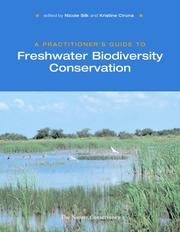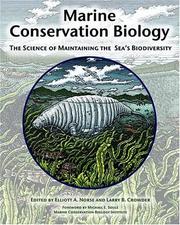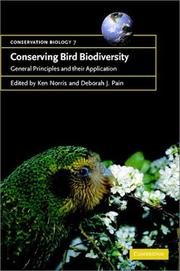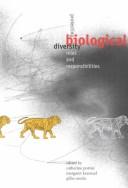| Listing 1 - 10 of 172 | << page >> |
Sort by
|

ISBN: 0195089103 9786610527380 0195358368 1280527382 1429405929 9781429405928 9781280527388 9780195089103 0197701191 Year: 1994 Publisher: New York (N.Y.) : Oxford university press,
Abstract | Keywords | Export | Availability | Bookmark
 Loading...
Loading...Choose an application
- Reference Manager
- EndNote
- RefWorks (Direct export to RefWorks)
This text details a solution to species loss: the privatization of genetic information. It makes the case that the world should abandon the doctrine of "the common heritage of mankind" and create private property rights over genes.
Privatisation --- Privatisering --- Privatization --- Germplasm resources --- Biodiversity conservation --- Privatization. --- #SBIB:17H17 --- #SBIB:17H20 --- Denationalization --- Contracting out --- Corporatization --- Government ownership --- Gene resources --- Genetic resources --- Germ plasm resources --- Resources, Germplasm --- Breeding --- Genetics --- Natural resources --- Economic aspects. --- Milieu en ethiek --- Sociale wijsbegeerte: algemeen --- Biodiversity conservation. --- Biological diversity conservation. --- Germplasm resources. --- Germplasm resources - Economic aspects. --- Ecology --- Earth & Environmental Sciences --- Economic aspects --- Plasma germinatif --- Biological diversity conservation --- Biological diversity conservation - Economic aspects.


ISBN: 1597266191 1429497890 9781429497893 9781597260442 1597260444 9781597260435 1597260436 1597260444 1597260436 Year: 2005 Publisher: Washington, D.C. Island Press
Abstract | Keywords | Export | Availability | Bookmark
 Loading...
Loading...Choose an application
- Reference Manager
- EndNote
- RefWorks (Direct export to RefWorks)

ISBN: 1280527951 9786610527953 0195357337 1429415886 0197560806 9781429415880 9781280527951 9780195095548 0195095545 Year: 1997 Publisher: New York Oxford University Press
Abstract | Keywords | Export | Availability | Bookmark
 Loading...
Loading...Choose an application
- Reference Manager
- EndNote
- RefWorks (Direct export to RefWorks)
During the past century, tropical rain forests have been reduced to about half of their original area, with a consequent loss of biodiversity. This book takes a close look at how this has happened and what the consequences may be, with an emphasis on those strategies that have proven successful in stemming the loss of plant and animal inhabitants.
Biodiversity conservation. --- Biodiversity conservation - Tropics. --- Biological diversity conservation. --- Biodiversity conservation --- Earth & Environmental Sciences --- Ecology --- Conservation biology. --- Biodiversity --- Biological diversity conservation --- Conservation of biodiversity --- Diversity conservation, Biological --- Gender mainstreaming in biodiversity conservation --- Maintenance of biological diversity --- Preservation of biological diversity --- Conservation --- Nature conservation --- Conservation of natural resources --- Ecosystem management

ISBN: 1597344958 9786612357831 1282357832 0520937775 9780520937772 1417520442 9781417520442 0520223098 9780520223097 0520241037 9780520241039 9781597344951 9781282357839 Year: 2004 Publisher: Berkeley : University of California Press,
Abstract | Keywords | Export | Availability | Bookmark
 Loading...
Loading...Choose an application
- Reference Manager
- EndNote
- RefWorks (Direct export to RefWorks)
The beautiful tropical dry forest of northwest Costa Rica, with its highly seasonal rainfall and diversely vegetated landscape, is disappearing even more rapidly than Costa Rica's better-known rain forest, primarily because it has been easier to convert to agriculture. This book, based on more than thirty years of study, offers the first comprehensive look at the ecology, biodiversity, and conservation status of this endangered and fragile region. The contributors, from Costa Rica, Britain, Mexico, and the United States, and representing the fields of ecology, environmental education, policy, and the law, examine the major plant and animal groups living in the dry forest and present the first technical evaluation of Costa Rica's conservation efforts. As they assess the status of their area of specialty in the dry forest, the contributors also look beyond this particular region to show how its plants and animals are ecologically and evolutionarily connected to other geographic areas in Costa Rica and Central America. Their chapters cover topics such as watershed and coastal management, plant phenology, pollination, insects, birds, mammals, amphibians, and reptiles. They also consider the socioeconomic, policy, legal, and political aspects of biodiversity conservation, giving the volume a wide-ranging perspective and making a unique contribution to our knowledge of the tropical dry forest. The book concludes with an important synthesis of the contributors' recommendations on future directions, policies, and actions that will better conserve biodiversity in Costa Rica and other neotropical forests as well.
Forest ecology --- Forest biodiversity conservation --- Forest ecosystems --- Forests and forestry --- Ecology --- Conservation of forest biodiversity --- Forest biodiversity --- Forest biological diversity conservation --- Biodiversity conservation --- Forest conservation --- Conservation --- Biodiversity --- Biological diversity conservation --- Conservation of biodiversity --- Diversity conservation, Biological --- Gender mainstreaming in biodiversity conservation --- Maintenance of biological diversity --- Preservation of biological diversity --- Conservation of natural resources --- Ecosystem management

ISBN: 1597267716 1435648560 9781435648562 9781559636612 1559636610 9781559636629 1559636629 9781597267717 9781597267717 Year: 2005 Publisher: Washington Island Press
Abstract | Keywords | Export | Availability | Bookmark
 Loading...
Loading...Choose an application
- Reference Manager
- EndNote
- RefWorks (Direct export to RefWorks)
Marine biodiversity conservation. --- Biodiversity conservation. --- Biodiversity --- Biological diversity conservation --- Conservation of biodiversity --- Diversity conservation, Biological --- Gender mainstreaming in biodiversity conservation --- Maintenance of biological diversity --- Preservation of biological diversity --- Conservation of natural resources --- Ecosystem management --- Conservation of marine biodiversity --- Marine biodiversity --- Marine biological diversity conservation --- Aquatic biodiversity conservation --- Marine resources conservation --- Conservation
Book
ISBN: 1783741589 1783741570 1783741597 2821876122 1783741600 Year: 2015 Publisher: Open Book Publishers
Abstract | Keywords | Export | Availability | Bookmark
 Loading...
Loading...Choose an application
- Reference Manager
- EndNote
- RefWorks (Direct export to RefWorks)
This book provides an assessment of the effectiveness of 648 conservation interventions based on summarized scientific evidence. Chapters cover the practical global conservation of amphibians, bats and birds, conservation of European farmland biodiversity and some aspects of enhancing natural pest control, enhancing soil fertility and control of freshwater invasives. It contains key results from the summarized evidence for each conservation intervention and an assessment of the effectiveness of each by international expert panels. The accompanying website www.conservationevidence.com describes each of the studies individually and provides full references.
Biodiversity conservation --- Management. --- Government policy. --- Biodiversity --- Biological diversity conservation --- Conservation of biodiversity --- Diversity conservation, Biological --- Gender mainstreaming in biodiversity conservation --- Maintenance of biological diversity --- Preservation of biological diversity --- Conservation --- Conservation of natural resources --- Ecosystem management --- conservation --- environment protection --- biodiversity --- animals
Book
ISBN: 1789232333 1789232325 183881261X Year: 2018 Publisher: IntechOpen
Abstract | Keywords | Export | Availability | Bookmark
 Loading...
Loading...Choose an application
- Reference Manager
- EndNote
- RefWorks (Direct export to RefWorks)
The present book offers an overall up-to-date overview of the biological diversity, comprising many interesting chapters focussing on the different aspects of biodiversity. Most of the chapters include findings of investigations and observations on biodiversity, whilst a few are based on statistically and theoretically derived information. The book produced sufficient information on the occurrence and distribution of many plant and animal species or groups of organisms with environmental estimates from a wide variety of interesting terrestrial and aquatic habitats. With 18 interesting and elaborately prepared chapters, the present book would definitely be an ideal source of scientific information to the advanced students, junior researchers, scientists and a portion of the public involved in ecology and other research areas involving biodiversity studies. It will also help to the development of the growing awareness of the close linkage between the conversation of biodiversity and economic development.
Biodiversity conservation. --- Biodiversity --- Biological diversity conservation --- Conservation of biodiversity --- Diversity conservation, Biological --- Gender mainstreaming in biodiversity conservation --- Maintenance of biological diversity --- Preservation of biological diversity --- Conservation of natural resources --- Ecosystem management --- Conservation --- Life Sciences --- Ecology --- Environmental Sciences
Book
ISBN: 9535153145 9535107194 Year: 2012 Publisher: IntechOpen
Abstract | Keywords | Export | Availability | Bookmark
 Loading...
Loading...Choose an application
- Reference Manager
- EndNote
- RefWorks (Direct export to RefWorks)
This book "Biodiversity Conservation and Utilization in a Diverse World" sees biodiversity as management and utilization of resources in satisfying human needs in multi-sectional areas including agriculture, forestry, fisheries, wildlife and other exhaustible and inexhaustible resources. Its value is to fulfill actual human preferences and variability of life is measured by amount of genetic variation available. In viewing diversity as an ultimate moral value, one is faced with a situation in environmental preservation in order to allow components of total diversity to flourish and constitute a threat to continuous existence and decrease total diversity. The overall importance described economic benefits from bio-diversity, though difficult to measure and varying, but are limited on a local scale, increase on a regional or national scale and become potentially substantial on a transnational or global scale.
Biodiversity conservation. --- Biodiversity --- Biological diversity conservation --- Conservation of biodiversity --- Diversity conservation, Biological --- Gender mainstreaming in biodiversity conservation --- Maintenance of biological diversity --- Preservation of biological diversity --- Conservation of natural resources --- Ecosystem management --- Conservation

ISBN: 1107120969 1280418044 9786610418046 0511176767 1139146572 051106702X 0511060718 0511606303 0511325592 0511069154 9780511067020 9780511060717 9780521783408 0521783402 9780521789493 0521789494 9780511069154 9780511606304 9781107120969 9781280418044 6610418047 9780511176760 9781139146579 9780511325595 Year: 2002 Publisher: Cambridge, U.K. ; New York : Cambridge University Press,
Abstract | Keywords | Export | Availability | Bookmark
 Loading...
Loading...Choose an application
- Reference Manager
- EndNote
- RefWorks (Direct export to RefWorks)
The earth's biodiversity currently faces an extinction crisis that is unprecedented. Conservationists attempt to intervene in the extinction process either locally by protecting or restoring important species and habitats, or at national and international levels by influencing key policies and promoting debate. Reliable information is the foundation upon which these efforts are based, which places research at the heart of biodiversity conservation. The role of research in such conservation is diverse. It includes understanding why biodiversity is important, defining 'units' of biodiversity, priority-setting for species and sites, managing endangered and declining populations, understanding large-scale processes, making predictions about the future and interfacing with training, education, public awareness and policy initiatives. Using examples from a wide range of bird conservation work worldwide, researchers consider the principles underlying these issues, and illustrate how these principles have been applied to address actual conservation problems for students, practitioners and researchers in conservation biology.
Birds --- Biodiversity conservation. --- Biodiversity --- Biological diversity conservation --- Conservation of biodiversity --- Diversity conservation, Biological --- Gender mainstreaming in biodiversity conservation --- Maintenance of biological diversity --- Preservation of biological diversity --- Conservation of natural resources --- Ecosystem management --- Birds, Protection of --- Conservation. --- Conservation

ISBN: 1282859145 9786612859144 0773569022 9780773569027 0773521585 9780773521582 0773521593 9780773521599 Year: 2001 Publisher: Montreal McGill-Queen's University Press
Abstract | Keywords | Export | Availability | Bookmark
 Loading...
Loading...Choose an application
- Reference Manager
- EndNote
- RefWorks (Direct export to RefWorks)
Catherine Potvin, Margaret Kraenzel, and Gilles Seutin asked scientists from developing countries to summarize their experiences of international collaboration and to suggest attitudes and practices that would lead to more fruitful exchanges with northern scientists. They also asked scholars to provide an analytical framework in which these issues could be discussed and to identify possible solutions to questions such as: What are the responsibilities of first world scientists involved in conservation actions in developing countries? How can biologists work toward the protection of biodiversity while being respectful of the human desire for a better future? The resulting papers analyse specific situations encountered in countries such as Democratic Republic of Congo, Madagascar, India, and Panama and discuss the philosophical basis for environmental research. They also examine the work of two institutions whose projects in developing countries have been particularly effective through outreach and attention to local values and needs and who propose a pluralistic view of conservation biology ethics. Protecting Biological Diversity seeks to encourage students and professionals involved in conservation projects to adopt culturally sensitive attitudes that will lead to greater effectiveness and efficiency in conservation and greater respect for the differences of others. Contributors include H Baser (Canadian International Development Agency, Ottawa), P. Butler (Rare Centre for Tropical Conservation, Saint Lucia), R. Cansari (McGill University), A.K. Gupta (Indian Institute of Management, India), M. Martinez-Velarde (Universidad Santa Maria la Antigua, Panama), L. Mubalama (Institut congolais pour la conservation de la nature, Zaire), B.J Norton (School of Public Policy, Atlanta), L. Packard (Texas A&M University), M.H. Parizeau (Université Laval), L.H. Rakotovao (Centre national de recherche en environnement, Madagascar), V. Regis (Rare Centre for Tropical Conservation (Saint Lucia), P. Weeks (The Environmental Institute of Houston), and G. Wigley (Ottawa).
Biodiversity conservation --- Biodiversity --- Biological diversity conservation --- Conservation of biodiversity --- Diversity conservation, Biological --- Gender mainstreaming in biodiversity conservation --- Maintenance of biological diversity --- Preservation of biological diversity --- Conservation of natural resources --- Ecosystem management --- Moral and ethical aspects --- Conservation
| Listing 1 - 10 of 172 | << page >> |
Sort by
|

 Search
Search Feedback
Feedback About UniCat
About UniCat  Help
Help News
News